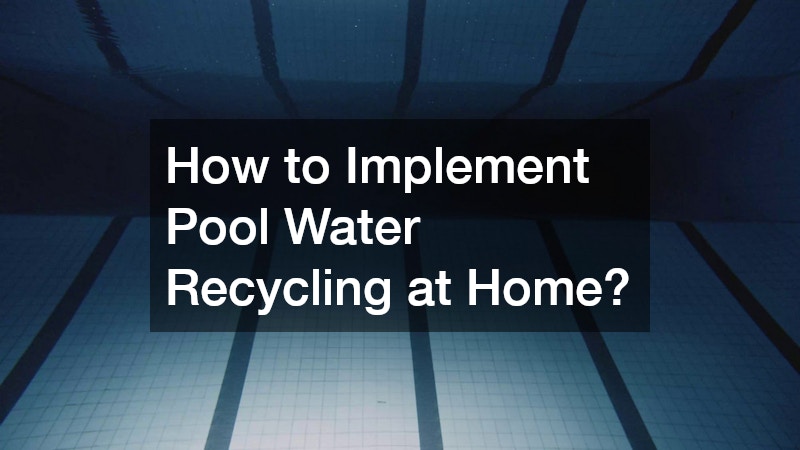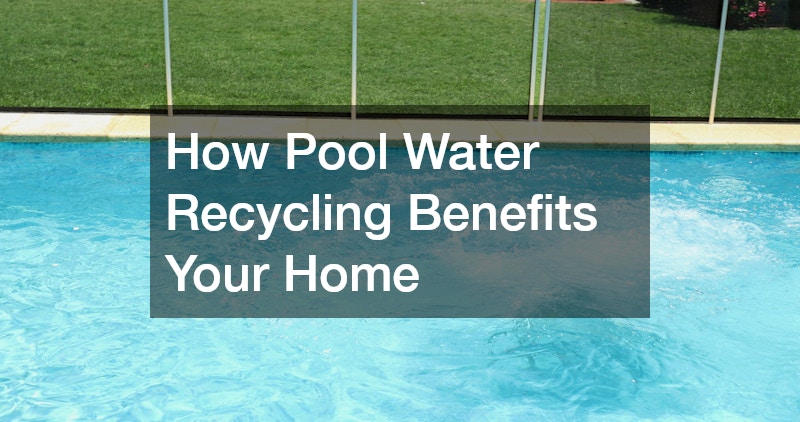In today’s world, sustainable practices are no longer just an option; they are a necessity. Water conservation has become a critical focus as we strive to manage our natural resources responsibly. Pool water recycling emerges as an innovative solution that aligns perfectly with these sustainability goals, offering homeowners an effective means to conserve water while maintaining a functional and enjoyable pool environment.
Traditional pool maintenance methods often involve significant water waste due to the need for frequent draining and refilling. This practice is not only costly but also environmentally detrimental.
By adopting pool water recycling, homeowners can significantly reduce their water footprint, aiding conservation efforts and fostering a greener lifestyle.
Pool water recycling is a relatively new concept that has gained traction among eco-conscious homeowners. It involves the treatment and reuse of existing pool water, thus minimizing the need for fresh water. This process not only saves water but also aligns with the broader objective of reducing environmental impact.
What is Pool Water Recycling?
Definition and Process Overview
Pool water recycling refers to the process of treating used pool water so it can be reused safely. This involves a filtration system that removes impurities and pollutants, making the water suitable for reuse.
The process typically involves several stages, including mechanical filtration, chemical balancing, and disinfection. These steps ensure that recycled water meets the necessary health and safety standards for reuse in a pool.
With efficient systems in place, pool water recycling can significantly extend the life of the water. This longevity is crucial for maintaining consistent water quality and reducing the need for fresh water inputs.
Differences from Traditional Pool Maintenance
Unlike traditional maintenance, pool water recycling does not require the frequent draining of pool water. This approach conserves water by consistently treating and reusing existing supplies.
Traditional maintenance often relies heavily on the use of chemicals to keep the pool clean. In contrast, recycling focuses on mechanical filtration and reduces the dependency on chemicals, promoting a healthier pool environment.
Additionally, the emphasis on minimizing water waste sets pool water recycling apart. By embracing this modern method, homeowners can contribute to conservation efforts while enjoying the benefits of a well-maintained pool.
How Does Pool Water Recycling Save Water?
Reduction in Drainage Frequency
By recycling pool water, homeowners can drastically cut down on how often they need to drain their pools. This reduced drainage frequency directly translates to significant water savings.
Each avoided drainage and refill cycle saves thousands of gallons of water. Consequently, the cumulative water savings over time contribute greatly to water conservation efforts.
The reduction in drainage not only saves water but also reduces the wear and tear on pool surfaces. This can extend the life of the pool structure and further promote sustainability.
Efficient Filtration Systems
Modern filtration systems used in pool water recycling are designed to be highly efficient, making them a key component in water conservation. These systems remove debris and impurities without the constant need for fresh water.
Such filters use advanced technology to ensure that the cleaned water meets safety standards for reuse. This promotes a clean, healthy pool environment while slashing the need for additional water resources.
The effectiveness of these systems in maintaining water quality makes them a vital part of any pool water recycling setup. Their contribution to sustainability cannot be overstated, as they optimize water use in every cycle.
What Are the Financial Benefits of Pool Water Recycling?
Reduction in Water Bills
One of the standout financial benefits of pool water recycling is the potential reduction in water bills. By using recycled water, homeowners significantly reduce their dependency on municipal water supplies.
This reduction is particularly impactful in regions where water prices are high, translating into noticeable savings on monthly utility bills. Over time, these savings can offset the initial investment in a recycling system.
Long-term Pool Maintenance Savings
In addition to lower water bills, pool water recycling offers long-term savings on pool maintenance costs. Traditional maintenance often requires frequent chemical purchases and more intensive cleanings.
By reducing water waste and chemical dependency, recycling systems cut down on these additional costs, allowing homeowners to allocate their resources more efficiently. Over time, the accumulated savings can be substantial.
Are There Environmental Benefits?
Decreased Water Wastage
Reducing water wastage is one of the core environmental benefits of pool water recycling. Every gallon of water conserved through recycling contributes to the preservation of global water resources.
This approach aligns with broader environmental goals by minimizing unnecessary water use and promoting sustainability. In regions facing water scarcity, this impact is particularly profound, making it a worthwhile initiative.
Lower Chemical Usage
Another significant environmental benefit is the reduction in chemical use required for pool maintenance. With efficient filtration systems, the need for chemicals like chlorine can be minimized.
This reduction leads to a healthier environment both around the pool area and in the broader ecosystem. Lower chemical usage reduces the risk of harmful runoff entering local waterways, promoting ecological balance.
How to Implement Pool Water Recycling at Home?
Necessary Equipment and Setup
To implement pool water recycling at home, specific equipment and setup processes are necessary. Homeowners need to invest in a quality filtration and treatment system tailored to their pool’s size and needs.
These systems often include filters, pumps, and chemical balancing systems that work together to clean and purify the water. Correct installation and setup are crucial for ensuring the system functions efficiently.
Best Practices and Maintenance Tips
Maintaining an efficient pool water recycling system requires adhering to best practices. Regular system checks and cleaning ensure that everything is functioning as intended.
It’s also important to monitor the chemical balance of the water regularly, even if it requires fewer chemicals overall. Keeping the system well-maintained will prolong its life and maximize water conservation efforts.












